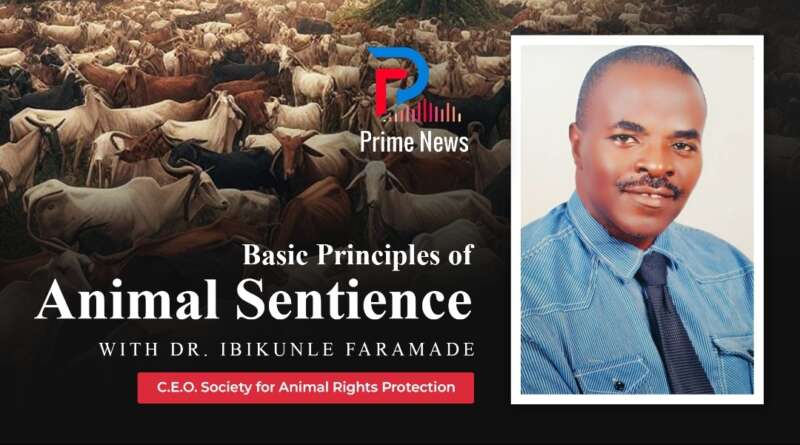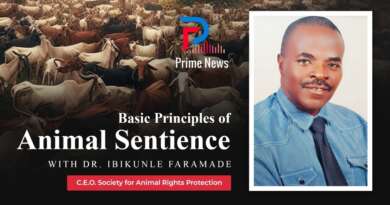Humane Slaughter of Livestock and Animals Used for Sacrifice During Religious Worship
By Dr Ibikunle Faramade
Food animals, made up of livestock (cattle, sheep, goat, pigs) and poultry are produced for the sole purpose of human consumption in one form or another. All the efforts of farmers to produce healthy animals which has gained acceptable body weight within the specified period of time are to meet the nutritional requirements of humans via the meat value chain.
Food animals and poultry cannot be regarded as meat until they are slaughtered. Therefore, slaughtering is the critical means by which food animals enters into the food chain.
In the interest of animal welfare in many advanced countries, laws were put in place to regulate the activities of all those involved in the business of transforming livestock into meat.Some of the developing countries, including Nigeria have also followed suit with different levels of success in the area of implementation.
What is animal slaughter? Slaughter means the killing of an animal in a designated place (slaughter slab, abattoir) for the purpose of human consumption. It is after the animal had been killed that the carcass would then be subjected to a thorough post mortem examination (in contrast to ante mortem examination) by a public health veterinarian to certify the meat as wholesome and fit for human consumption.
Humane animal slaughter, therefore, could be described as animal slaughter in which deliberate efforts are made to reduce pain and suffering during the process of slaughter before the eventual death of the animal. Humane slaughter also involves how animals are transported from the farm to the slaughter slab/abattoir and how they are handled during the process of loading and unloading from the truck and passage to the lirage.
There are conventional methods of humane slaughter for all categories of food animals and poultry that are globally recognized. The first method involves stunning prior to slaughter while the second method is stunning accompanied by slaughter simultaneously.
Stunning causes an animal to lose consciousness, so the animal can’t feel pain when the head is being severed. There are different types of stunning, viz; penetrating captive bolts (for large animals), electrical method in which electric current is passed through the brain or the heart via specially designed equipment (large pair of tongs) and the use of gas (mainly carbon dioxide).
The major stumbling block to the full adoption of these humane methods of animal slaughter in Nigeria is mainly religious. Islamic and Judeo-Christian (Judaism & Christianity) religions have prescribed mode of animal slaughter which basically involve bleeding the animal to death through the severance of the head (cutting-off the blood vessels at the neck region, i.e. carotid and jugular arteries) with a sharp knife.
Notwithstanding, in most advanced countries of the world, especially, in the global north, religious slaughtering is permitted only during religious worship by adherents. Animals slaughtered routinely for human consumption are mandated to use stunning before slaughtering. This also facilitate mechanical processing and improved hygiene. This is not so in Nigeria.
The use of such techniques are not fully acceptable because they are viewed as contraventions of the status quo. Therefore, religious leaders have a role to play to promote animal welfare without necessarily running afoul any perceived religious injunctions. It should be noted that these humane slaughter methods are designed to be used in poultry and livestock which are considered as food animals.
Sadly, in Nigeria, there are other animals that are not officially recognized as food animals that are consumed as such. This is because of cultural orientation and traditional belief system or perception that some of these animals have medicinal value when consumed. Chief among these animals are dogs. The consumption of dogs as meat in Nigeria (popularly called 404) cut across many states of the federation. These include Cross River, Akwa Ibom, Plateau, Ondo, Taraba, Gombe, Ebonyi among others. These hapless dogs are transported in most in-humane way, cramped together in metal cages and ‘slaughtered’ in a most gruesome manner.
While it is difficult, if not impossible to outrightly stop age old culturally entrenched practices (which are not known to the law as crimes) to which people are deeply committed to sustain, due to multifarious reasons, it is hereby advocated that such practice (of dog killing) should be done in a way to demonstrate humaneness and recognition of sentience.
Recently, the Republic of South Korea renowned for dog consumption globally, among other countries outlawed killing dogs for meat. Although, there is always a difference between legislation and law enforcement in many parts of the world, the open ban on ‘dog slaughter’ has passed a message of dissatisfaction with the status quo. This bold step could be replicated in Nigeria in the interest of promotion of animal welfare.However, if we cannot follow the route of outright ban, because of the plurality of cultures, traditions and beliefs, being a diverse and heterogeneous country, a code of ethics should be developed to serve as a guide for the operators of the business.
Apart from dogs and other unrecognized sources of meat in Nigeria, the enforcement of extant laws governing food animal slaughter is hereby recommended. In many parts of the country, slaughter slabs and abattoirs are poorly managed and understaffed. Most of the activities going on at these slaughter slabs/ abattoirs are inimical to animal welfare. Relevant government agencies and departments need to rise to their responsibilities in this regard.
There is need for continuous advocacy and sensitization of the butchers using the platform of their association to increase their awareness of animal welfare and prevention of cruelty. This would go a long way to secure their commitment and cooperation. Until participatory approach of promotion of animal welfare and prevention of cruelty, especially at the slaughter slabs and abattoirs is adopted, implementing animal welfare policies would remain herculean in that terrain.
Furthermore, another important aspect of animal slaughter requiring humaneness is the use of animals as ‘sacrificial animal’ during African indigenous religious worship. In the western part of Nigeria, notably among the Ogun (god of iron) adherents, the use of dogs is sacrosanct. It is the considered opinion of this writer, that the philosophy or ethics surrounding the acceptability of the animal sacrifice to the god has in it some elements of protection of animal welfare. This is because the head of the dog being sacrificed must be severed at once. There is no opportunity for a second attempt! If it is not achieved once, it signals doom and misfortune! This ensures that the dog is not exposed to the agony of writhing in pains of repeated effort to decapitate the animal. This concept have been passed down from generation to generation making it a sustainable practice.
In conclusion, it should be noted that the use of animals and animal products as food, medicine, religious sacrifices/ rituals etc. is acceptable in most parts of the world, except in vegan communities. Humans should consume animals with high degree of responsibility, deep rooted in their recognition of animals as sentient beings. The manner of producing them (husbandry practices) and the way by which we terminate their lives (slaughter) should show that we empathize with them, recognizing that they are not lifeless or inanimate.
It is by so doing that we truly could show that we are Homo sapiens, responsible for safeguarding other creatures with good conscience.


Dr. Ibikunle Faramade is a veterinary pathologist and a lecturer at the Federal College of Animal Health & Production Technology, Apata. Ibadan. He’s the C.E.O of the Society for Animal Rights Protection, a non-profit and a non-governmental organization dedicated to the promotion of animal welfare, animal rights and prevention of cruelty to animals. animalrightsprotection2020@gmail.com , +2348028305284



